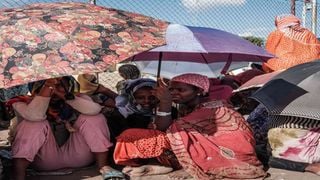
Refugees who fled Ethiopia's Tigray conflict at the border reception centre in Hamdayit, Eastern Sudan, on December 4, 2020.
| Yasuyoshi Chuba | AFPAfrica
Premium
Tigray War: A tale of genocide, rape and starvation
Since the Ethiopian government started a military offensive in Tigray in the northern part of the country, the account of what has been happening in the region has mainly come from the authorities.
According to Ethiopia’s Prime Minister Abiy Ahmed, there have been no civilian casualties in the region since the war started. However, civil society organisations from the region are claiming that thousands of civilians have been killed in the bloody war that continues to ravage major parts of Tigray.

Ethiopian Prime Minister Abiy Ahmed.
Numerous NGOs in the region accuse the Ethiopian government of inviting the Somali and Eritrean forces to join the war -- which they describe as a “bloodbath” against the Tigrayans.
“There are reports of arbitrary killing and summary execution of civilians throughout Tigray. So far, (thousands of) civilian killings have been reported, according to a report on February 2 by a coalition of three opposition parties in Tigray,” said the Seb-Hidri Civil Society group of Tigray.
An estimated 800 unarmed civilians were slaughtered in a day in Axum. Another 1,100 Tigrayans were murdered by an armed Amhara youth group called Fano,” added the group.
An additional 165 unarmed civilians sheltered at St Mary Dengelet Church were also executed by Eritrean and Ethiopian Soldiers, alleged the lobby group Edaga-Hamus.
Rape is also being used as a weapon by the invading armies who are accused of forcing grandfathers to rape their granddaughters and sons, their mothers or risk being killed in front of their family members.

Ethiopians from Tigray region living in the US, gather near the White House in Washington DC, on February 25, 2021, asking for the end of the military conflict in Ethiopia’s Tigray region between regional forces and the Ethiopian federal army.
Mr Teshager Tsigab, an Tigrayan activist and head of the legal team for the Seb-Hidri Civil Society, who is now seeking asylum in Kenya, told the Nation that the war is targeting any Tigrayan and he, being one of the vocal activists in Tigray, had to flee for his life.
Starvation
He alleged there was starvation in Tigray, which has seen many lose their lives in the past three and a half months.
“They are not allowing people to use their resources, their money, and their property because they want to use starvation as a weapon. If that is not genocide, then I do not know what will be said,” he told the Nation.

Lawyer Teshager Tsigab.
With 4.5 million Tigrayans facing starvation, the Ethiopian government recently pledged to support them.
"The government of Ethiopia remains committed to working closely with its humanitarian and development partners to address any outstanding challenges that could hinder the safe, effective, and efficient delivery of humanitarian assistance to all affected populations," it said through its Embassy in London on January 15.
Many Tigrayans are reportedly dying due to lack of access to medical care as several health facilities in the region have been looted and destroyed by the invading armies.
“Destroying health facilities and looting all the supportive materials including ambulances at this time of war, starvation, displacement and absent clean water and latrines is designed to inflict maximum death (extermination) on ethnic Tigray due to diarrhoea, wounds, malnutrition, TB, malaria, which have become abundant during this time of crisis,” said the Seb-Hidri Civil Society.
Schools, including Adigrat and Axum universities, have been looted and the Eritrean Army has been accused of doing most of the looting.
“This is a massacre. My colleagues in Axum University were killed, there are uncountable graves in Tigray, yet no one is talking about this. It is painful,” Mr Tsigab told the Nation.
Domestic animals have been killed and industries destroyed. Public enterprises including Almeda textile, Addis Pharmaceutical Factory, Sheba leather Factory, Ezana mining as well as private entities such as Goda Glass Factory and Semayata Marbles have been disassembled and looted.
“What could not be disassembled and taken to the aforementioned destinations was completely burnt to ashes by the invading forces,” the lobby group said.
Turned his home to a military camp
Private homes have also not been spared in the war. Mr Tsigab, also an executive member of the Seb-Hidri Civil Society of Tigray, lost his home to the Ethiopian Special Forces who have now turned his home to a military camp.
Close to 50 per cent of the Tigray land, estimated to be about 50,000 square kilometres is now under either Eritrea’s or Amhara’s flags. They accuse the forces of conducting an ethnic cleansing in the areas they have seized and pushing the indigenous people to concentration camps. This has seen more than two million Tigrayans displaced, while thousands have fled to South Sudan and Sudan.
“They (Amhara Special Forces) have brought their own people from Gondar and Gojjam instead. They are now living in the houses and the lands originally inhabited by the Tigrinya speakers who are now either dead or fleeing,” Seb-Hidri Civil Society said.
“Ethiopia is a living hell to anyone with Tigray blood. Ethnic Tigrayans are being blackmailed, dehumanised, humiliated and abused for just who they are. I cannot change who I am, I am Tigray, nothing can change that,” the group added.
Cultural heritage sites have also been affected by the current war. World heritage sites in Tigray such as the Al-Nejashi Mosque, Debredamo and Assimba monasteries have allegedly been shelled. The Axum Obelisk has also been fired at by one of the armies.
Ancient scripts and other precious historical materials are currently missing from monasteries in Tigray.
The world is hugely in the dark with regards to the conflict and humanitarian crisis in Tigray, where there is no electricity, telephone and banking services as well as the internet.
“The government of Ethiopia and the genocide accomplices continue to block humanitarian aid. They are doing everything in their capacity to decimate and destroy Tigray, to erase Tigray from the map and exterminate ethnic Tigray like never seen before,” lamented the organisation.
Ethiopian refugees gather to celebrate the 46th anniversary of the Tigray People's Liberation Front at Um Raquba refugee camp in Gedaref, eastern Sudan, on February 19, 2021.
It cautions that should nothing be done and the world remains silent, a repeat of the Rwanda genocide could be in the offing.
“Twenty-seven years later, here we are, repeating history, a déjà vu, this time in Ethiopia’s Tigray. “Never Again” is happening today, here in Tigray!” said Seb-Hidri.
Tigrayans are appealing to the international community whom they have accused of offering lip-service in dealing with the Tigray crisis, to decisively act and stop the genocide on ethnic Tigrayans by their enemies whom they termed as expansionists. They demand that the invasive armies withdraw from their region and called on Unesco to conduct an investigation into the destruction of ancient cultural heritage sites in Tigray.
“The Tigray people do not have an option but to defend themselves. They are constantly on the streets demonstrating even if they know there is a chance that they will die while doing it. I wish the international community works now. I call on the new Biden-led government of the USA to do something now,” pleaded Mr Tsigab.





